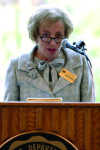Prindle Institute dedicated at DPU

"The concept of establishing an Institute was aimed at transforming the very nature of DePauw University, putting it on a different plateau," said Janet W. Prindle on Friday at the dedication of the Institute for Ethics that bears her name.
Prindle, a 1958 graduate of DePauw, said she believes that the Institute will make her alma mater "a destination for critical inquiry and discourse" and nurture faculty members, students, staff and visitors "in forming new thinking to resolve critical problems."
Prindle, a pioneer for women on Wall Street, was the first woman to be named partner at Neuberger Berman and has been a member of DePauw's Board of Trustees since 1990. Her generous gift funded the construction of Institute, which is located in the DePauw Nature Park.
In front of many of "the most important people in my life" -- about 200 DePauw alumni, administrators and faculty members -- Prindle explained, "The issue for me was either to give money away when I die, or to do so while I'm still alive so I can gain satisfaction from seeing it make a difference for a place that I love."
The Janet Prindle Institute for Ethics builds on DePauw's longstanding commitment to help its students become good citizens and make a positive difference in the world. Standing on the knoll of an old quarry site that is now part of the 520-acre DePauw University Nature Park, the Institute's beautiful setting provides an inspirational environment for gatherings to mine new veins of research, dialogue and teaching that probe the issues of ethical theory and practice. The Prindle Institute will be a touchstone for students as they face ethical challenges throughout their lives.
"When someone much needed arrives; when something takes place that can make an immense difference, we often say, ‘She arrived just in time' or ‘That happened not a moment too soon,'" noted John K. Roth, Robert and Carolyn Frederick Distinguished Visiting Professor of Ethics at DePauw. "This is how I think of Janet Prindle and the magnificent DePauw University Institute for Ethics that bears her name."
Roth says the Institute will be a place where thoughtful inquiry and "the heartbeats of ethics" will be probed, including questions such as, What should we do? What is right? Am I doing my best? How should we live?
"We faculty educate our students and ourselves in perilous times," Professor Roth stated. "In such times, places are needed where there can be inquiry and discourse about critical issues of our time, where, in particular, we faculty members can more fully be and become those who, in the words of the American poet Adrienne Rich, ‘bind, join, reweave, cohere, replenish, teach, advise, persuade, weigh arguments,' so that, as she puts it, ‘the work of perception can advance the never-to-be-finished, still-unbegun work of repair.' In my judgment, the Prindle Institute for Ethics is destined to be a preeminent place of that kind."
Paddy McShane, a 2007 graduate of DPU who is working at the Institute as an intern, spoke glowingly of her DePauw experience.
"I have made the best friends of my life and I have taken advantage of many wonderful and unique opportunities," she stated. "But I must also admit that along this journey I've also encountered many challenges from issues of personal ethics, such as what it means to be a good friend and roommate, to concern for pressing global issues, such as the pervasive hunger and poverty I encountered during the two Winter Terms I spent in Central America." McShane continued, "I stand in front of you today confident that the Janet Prindle Institute for Ethics will serve as an outstanding resource for other students as they encounter these sorts of ethical challenges."
The Prindle Institute was designed by Lake Flato Architects, leaders in green architecture, and its buildings will be LEED certified by the U.S. Green Building Council to underscore DePauw's commitment to sustainability. The architects carefully considered how to minimize the impact on the site's natural environment and use of natural resources while creating a stunning experiential learning environment. The buildings' exterior and interior finishes utilize locally-quarried limestone and regionally-harvested woods, and configuration of the structures is designed to allow a maximum amount of natural daylight into the interior spaces, thus decreasing energy use.
The Institute's features include: meeting spaces for groups of 8-100; a reception area and reflective spaces; offices and meeting areas; areas for study, small group discussion and informal interactions; a library; spaces for meals and receptions; and a fire pit on the knoll for discussions and gatherings.
The keynote address at the dedication was provided by the Rev. James A. Forbes Jr., senior minister emeritus at the Riverside Church in New York City and president of Healing of the Nations Foundation. He called the institute "something which could be a sign of better things ahead. For if we stop and think about what we're doing and ask the right questions about what's possible, it could be that even the difficulties of this present hour will begin to open up and let the world in its beauty -- in its contrasting beauty -- speak of better things ahead."
DePauw President Robert Bottoms, who will become Chancellor of the University next summer and assume the leadership of the Ethics Institute, recalled a quote by Neil Postman, who opined that "schooling can be about how to make a life, which is quite different from how to make a living."
Bottoms noted, "To a large degree, this is what we want to talk about in this Institute."
